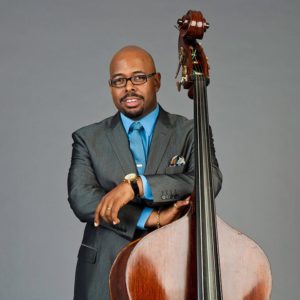 This is Christian McBride’s third year as Artistic Director of the Newport Jazz Festival. McBride continues to work closely with the Festival’s irrepressible, vigorous 93-year old founder, George Wein, who will eventually hand McBride the reins. As Artistic Director, McBride is the major curator of the lineup, with Wein’s counsel. Consistently an amazing mix of legendary jazz artists, newcomers, and current giants on the contemporary scene worldwide. The mix includes R&B, hip-hop, and genre mash-ups, ideally reflective of today’s jazz community.
This is Christian McBride’s third year as Artistic Director of the Newport Jazz Festival. McBride continues to work closely with the Festival’s irrepressible, vigorous 93-year old founder, George Wein, who will eventually hand McBride the reins. As Artistic Director, McBride is the major curator of the lineup, with Wein’s counsel. Consistently an amazing mix of legendary jazz artists, newcomers, and current giants on the contemporary scene worldwide. The mix includes R&B, hip-hop, and genre mash-ups, ideally reflective of today’s jazz community.
As a musician, in his only performance this year McBride will play bass with the legendary Herbie Hancock and drummer Vinnie Coliauta as a trio, on Saturday. Given McBride’s three decades-plus career as one of jazz’s most versatile performers, it’s surprising that this marks only his seventh time playing the Fest. When asked about what draws musicians to Newport, his answer was brief: “The history, the mythology, the recognition of all the great albums made there from Ellington, to Miles to ‘Trane and many more.”
On receiving his selection as Artistic Director, McBride said, “I had known George for years, not as well as some others, but we had always gotten along well. George had done some sniffing around. He had his folks working clandestinely and learned that beyond my work as a bass player, I’ve been serving as an Artistic Director for the past 20 years in several places. I had that position at the University of Richmond, I currently have it with NJPAC, and my wife, Melissa Walker, and I run the non-profit Jazz House Kids. I’m also the Associate Artistic Director of the Jazz Museum in Harlem. In October 2015 George called me to his apartment in New York, saying he had something really important to tell me. I had no idea what this was about, thinking it might be about a special project of some sort. He said to me, ‘I want you to be Artistic Director for the Festival. You’re the person I want to carry on my legacy.’ My mouth dropped open. What an honor! I think besides George seeing my experience in the various Artistic Director roles, he liked that I was open to all kinds of jazz.”
We talked about the key principles of George Wein’s vision that McBride aimed to uphold. Wein’s stated philosophy stood out in an Elmore (May 2012) article about him: “Young people are carrying the flag, but if they don’t have a stage to play on, they won’t grow. That is the direction I’m going in. I want them to be heard;” and “I’m looking for creative people who are familiar with jazz but not trying to copy it.” McBride said those two statements are very important, commenting, “Inside the past three years George has been very hands-on. Executive Director Jay Sweet and I run everything we do by George. The artistic diversity that’s in play is quite admirable. The Festival embraces swing, avant-garde, singers…just about every possible style. It’s our duty to present as much of the jazz community as we can, not just for entertainment, but we feel it’s our civic duty to do so.”
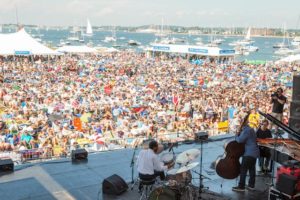
Mentioning that George himself started green, turning to label executives like John Hammond Sr. and Ahmet Ertegun for counsel, we asked McBride who he would turn to for guidance. “When George started there were no other festivals to follow. Now there are numerous festival directors I know and respect. While George is still here and vigorous, I talk to him all the time. He’s still the source and guiding light for every person who runs a major festival.” Commenting on Newport’s uniqueness, he said, “To a working musician the feel of that city is represented in the festival. Whether it’s in the U.S. or Europe, they are George Wein spin-offs. Newport is Ground Zero.”
Comparing the Newport audience to other festivals, we posed the question of catering to college students; with Berklee and other prestigious music schools close by, it can attract a younger crowd. McBride responded, “A lot of festivals do that now: Detroit with Wayne State, Monterey with Cal-Berkley…it’s another ‘Georgism.’ He realizes that times change. He’s always done a great job of staying with the times. Also, making the Festival non-profit was certainly key in giving us more artistic freedom.”
Among the biggest challenges an Artistic Director faces is that over the course of three days and 60-plus acts, an attendee cannot possibly see every performance. McBride noted, “It’s about the hard choices. I get my share of positive compliments, but the complaints usually center around ‘Why did you schedule this artist opposite this one when I wanted to see both?’
“I try to consciously keep my eye on balance. It’s important to have vocalists. People really like them and there are so many great ones out there. George also likes to have big bands on the bill, which you don’t see very much of these days because it’s expensive, but he feels that element is important, so you’ll see Maria Schneider and Darcy James Argue’s bands as just two examples. We want to have the free jazz element and the electric element and, of course, the traditional too.”
Would McBride like to change anything? “In these three years I’m still learning, but why change the playbook?”
We concluded our conversation with this writer’s observation that we’re experiencing a resurgence in jazz. McBride quickly responded, “That statement comes along every ten years. Jazz is steady. Ten years ago we heard about resurgence with Esperanza Spalding and then in the late ’90s with Diana Krall. In terms of the State of the Union of jazz, it’s steady, but jazz has an interesting challenge. There are more college-age people playing now than I can ever remember, and they all need gigs. Professional sports leagues solved the problem by expanding, but we all know the number of clubs and venues are not expanding. Jazz education has become a staple at so many great colleges and has spawned a wealth of talent. but the equation is proving difficult.”
Finally, why should music lovers attend the Newport Jazz Festival? McBride replied, “Often, when people think of festivals and the festival atmosphere, it’s selfies, lawn chairs, food and music, but with Newport, one can’t help but be deeply inspired by the history, and we try our best to present what’s happening at the core of the jazz community.”
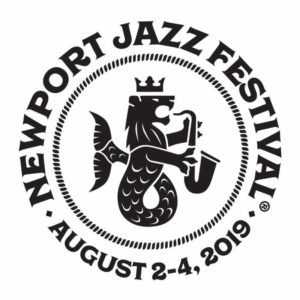 The 65th annual Newport Jazz Festival will be held August 2-4, 2019 at Fort Adams State Park in Newport, RI. Visit Newport Jazz and look for Elmore Magazine‘s coverage of the festival HERE.
The 65th annual Newport Jazz Festival will be held August 2-4, 2019 at Fort Adams State Park in Newport, RI. Visit Newport Jazz and look for Elmore Magazine‘s coverage of the festival HERE.
—Jim Hynes


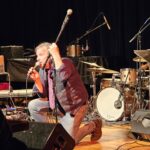


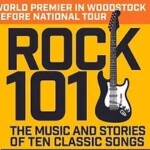

Be the first to comment!